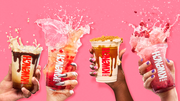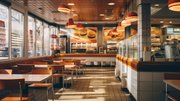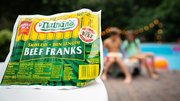Blog
Cut it out! QSR 2020 workplace safety tipsheet
For QSRs, the very name of the service category implies part of the risk these brands and their employees face when it comes to workplace injuries. Yes, things move very fast at such restaurants, which is among the many reasons to tune-up your brand's workplace safety procedures now for the best year ahead.

December 12, 2019
By Dan Killins/Employers Loss Control Program Manager
Recent data indicates that for every 100 people working across food service and hospitality there are a little more than three non-fatal on-the-job or job-related injuries annually. That not only causes a lot of misery for those involved, but the kinds of missed work days that wreak havoc on a whole QSR store team and beyond.
Additionally, on-the-job injuries and illnesses can also lead to higher workers' compensation costs, federal fines from organizations like the U.S. Occupational Safety and Health Administration, higher out-of-pocket expenses for the company in question, not to mention lower morale among any given team.
Any QSR operator hoping to make a dent in the number and frequency of workplace injuries in the coming year, is wise to take a look now at potential safety risks, in order to put measures in place to change those and the less-than-glowing future they portend for the company. To do that, here are three of the most common areas of risk that QSR operators face and top proven ways to prevent problems, while creating a safer workplace in the future.
Stop slipping up
It's easy in a fast-moving quick-service environment for kitchen or dining room spills to go unnoticed during any given shift, heightening the risk of someone slipping, tripping or falling. But QSR operators that teach employees that's it's absolutely essential to clean all spills, regardless of size, immediately stand to prevent themselves and their workers plenty of pain.
Also ingrain in employees that signs must also be placed around any spill until it is completely dry, so employees and patrons know to avoid the area. Similarly, brands that retain separate mops for front- and back-of-house cleanup contribute to building a safer workplace by facilitating quick, efficient cleanup.
It's also a great idea to require employees to wear non-slip footwear to prevent these types of injuries. And strongly consider, making sure that non-slip mats are always in place in areas prone to moisture, such as in front of sinks, cooking stations and ice machines. Finally, it's wise to keep a regular floor-cleaning scheduleS, including de-greasing areas prone to excessive oil, grease and liquid buildup like the floor around fryers and grills.
Sharpen cut prevention
Improper cutting, slicing, peeling and dicing is not only a constant in any QSR operation, but a constant threat to worker safety. Train employees about safety practices in operating potentially dangerous equipment like knives, mandolins, slicers and peelers. Curtail sources of distraction in prep areas, since inattention is a leading cause of knife injuries.
Require workers to wear personal protective equipment, like cut-resistant gloves, and keep knife and other cutting instrument blades in optimal sharpened condition to reduce injury risk. But since even the safest conditions can still be the setting for accidents, keep first aid kits nearby and fully stocked with bandages and infection-preventing ointments, while maintaining training in emergency procedure response to all types of injuries among employees.
Burn notice
Any working QSR kitchen is a functioning burn risk thanks to the relatively tight working space, rapid pace of orders and the presence of heat- and flame-producing equipment like stoves, fryers, grills, ovens, heat lamps and hot beverage machines.
Keep employees protected by mandating those who regularly work around such equipment wear personal protective equipment, including oven mitts, aprons and even re-attachable/detachable cookware handles. Similarly, make sure your restaurant or chain adheres to a regular cleaning and servicing schedule for grills, fryers and ovens and their respective vents, hoods and ducts, in order to reduce the risk of both fire and employee burns.
Lastly, though many employers assume everyone understands how to protect themselves from injury, every QSR should still have a formal employee safety training program, as well as encouraging a culture that is proactive about workplace safety.
In fact, some workers' compensation insurance carriers offer policyholders 24-hour access to an injured employee hotline that connects injured workers with registered nurses who can provide real-time guidance over the phone. But all QSRs must constantly remind employees that when severe injuries occur, emergency services must be called immediately.
 ChatGPT
ChatGPT Grok
Grok Perplexity
Perplexity Claude
Claude








